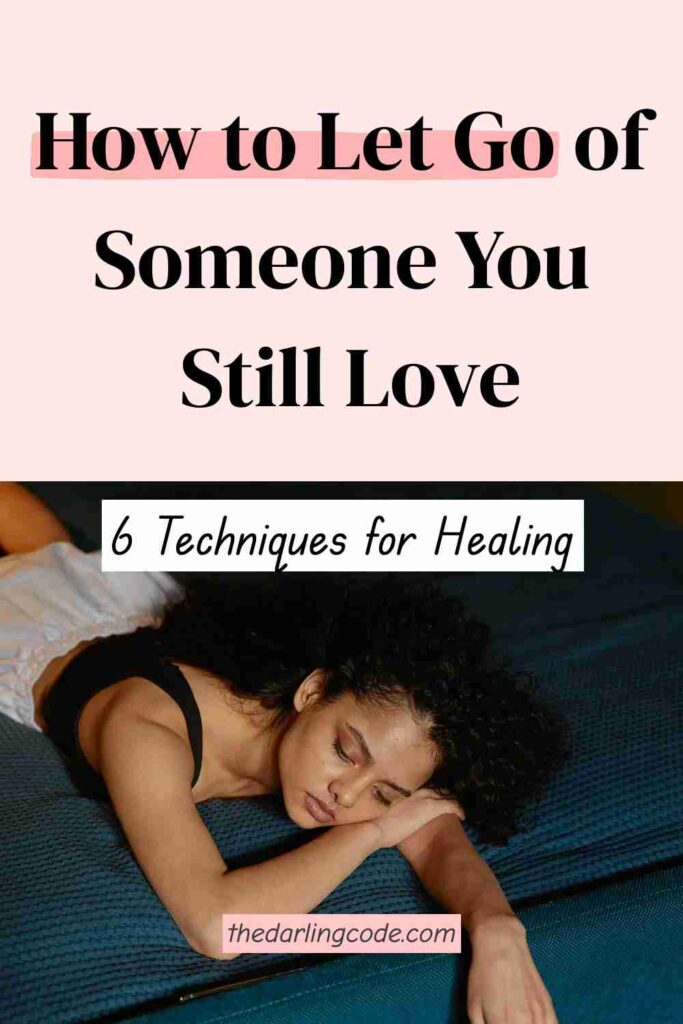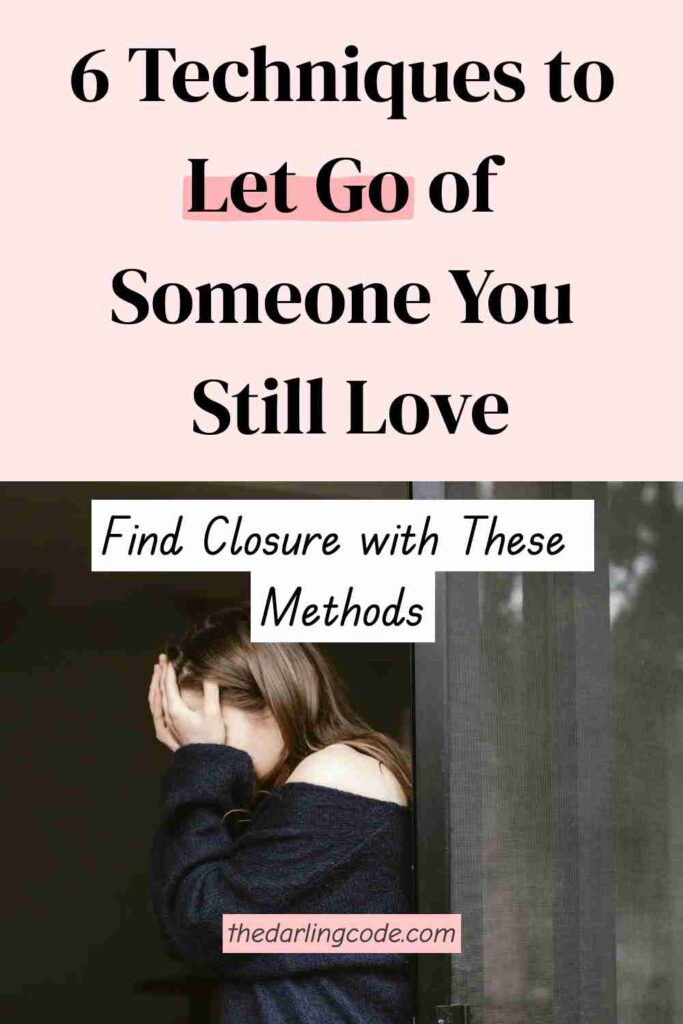6 Techniques to Let Go of Someone You Still Love
The experiences shared in this article are based on real emotional journeys, but all personal details are anonymized and used with the explicit written permission of the clients. Any resemblance to actual persons, living or dead, is purely coincidental. We are committed to treating all client stories with the utmost confidentiality and respect.
You’re standing in the grocery aisle, staring at the jar of peanut butter they always bought, and suddenly your throat tightens.
Or maybe you’re halfway through a Netflix show they recommended, and the theme song hits like a punch to the chest.
Letting go of someone you still love isn’t about flipping a switch—it’s more like rewiring a house while you’re still living in it.
As a relationship coach who’s walked this path with hundreds of clients (and yes, stumbled through my own heartbreaks), I’ve learned that healing isn’t linear, but it is possible.
Let’s talk about how to do this with kindness—for them, but mostly for you.
Save this article for later—Pin it to Pinterest and come back when you need it! 📌

1. Rewrite the Story You’re Telling Yourself
When my client Mara came to me after ending a five-year relationship, she kept repeating, “I wasted my best years.” But here’s the truth: How you frame the past shapes how you move forward. Instead of viewing love as a finite resource (“I’ll never feel this way again”), try reframing it as proof of your capacity to connect deeply.
Try this:
- Grab a journal and finish this sentence: “What I’m grieving isn’t just them—it’s…” (Maybe it’s the future you imagined, the inside jokes, or the way they made you feel safe.)
- Then, add: “What this experience taught me about myself is…” (Example: “I now know I can love fiercely, even when it’s hard.”)
I once dated someone who loved hiking—a hobby I initially hated. After we split, I realized those trails taught me resilience. Now, I hike solo every fall. The pain didn’t disappear, but it evolved.
2. Create “Emotional First Aid” Rituals
Heartbreak isn’t just emotional—it’s physical. Neuroscience shows rejection activates the same brain regions as physical pain. That’s why “just move on” advice falls flat. Instead, build micro-rituals to soothe your nervous system.
Examples:
- The 90-Second Reset: When a memory hits, set a timer. Breathe deeply for 90 seconds (the time it takes for an emotion to peak and pass). Imagine the feeling as a wave—you’re the shore, not the water.
- Sensory Grounding: Keep a “comfort kit” (mine has lavender oil, a smooth stone from a beach trip, and a playlist of instrumental piano). Use it when nostalgia feels overwhelming.
A client of mine, Rachel, swore by her “grief latte”—every Sunday, she’d visit a new coffee shop, order a fancy drink, and people-watch for 20 minutes. It became her weekly reminder: I’m building a life without them, one latte at a time.
3. Practice “Selective Nostalgia”
You don’t have to demonize the relationship to heal. But romanticizing it keeps you stuck. Let’s get real: even fairy-tale romances have unpaid bills and mismatched socks.
Action steps:
- List 3 things you don’t miss (their snoring, their flakiness with plans, the way they never loaded the dishwasher).
- Write 2 “counter-memories” for every sweet moment you replay. Example: “Yes, we had that magical New Year’s kiss… but remember when they forgot your birthday because they were ‘too busy gaming’?”
Balance isn’t about bitterness—it’s about seeing the full picture.
4. Redirect the “Love Energy”
Love is energy. When the target of that energy disappears, it pools inside you like a storm with nowhere to go. Channel it outward.
Ideas:
- Volunteer at an animal shelter (puppies don’t care if you cry while cuddling them).
- Cook a recipe they hated but you loved (my post-breakup kimchi fried rice phase was legendary).
- Text a friend: “I’m having a tough day—want to rant about your life for 10 minutes?” Shifting focus relieves the pressure.
One of my favorite client stories: After her divorce, Emily started knitting scarves for homeless shelters. “Every stitch felt like I was turning my sadness into something warm for someone else,” she said.
5. Set Boundaries—With Yourself
We obsess over blocking exes on social media, but the real work happens in your mind. How many times today did you mentally revisit that fight from 2019?
Try:
- The “Not Now” Jar: Write intrusive thoughts on slips of paper (“What if they come back?”) and drop them in. Review them monthly—you’ll be shocked how many lose their power.
- Time-Box Your Grief: Let yourself cry/vent/Google-stalk for 15 minutes daily—then shift gears. It sounds harsh, but structure prevents despair from becoming your full-time job.
Years ago, I caught myself rereading old texts at 2 a.m. My rule now? Phone stays in the kitchen after 10 p.m. Small boundaries = big progress.
6. Build Your “Future Self” Playbook
Healing isn’t just about releasing the past—it’s about creating something new. Ask: Who do I want to be in six months?
Exercises:
- The “Reverse Bucket List”: Write 10 things you’ve already survived (e.g., “Recovered from losing my job,” “Got through my first panic attack”). You’re stronger than you think.
- Letter to Future You: “Dear Me, Remember when we thought we’d never get over __? Look at us now. We…” Seal it and set a calendar reminder to open it in 3 months.
A client once told me, “I thought letting go meant forgetting. Now I see it’s making room.”
Final Words from The Darling Code
Start small. Maybe today you’ll delete their takeout app profile, or finally try that Zumba class they mocked. Healing isn’t a race—it’s a series of choices to prioritize you.
If you only remember one thing: You’re not losing love. You’re returning to yourself.
With heart,
The Darling Code
P.S. Save this to your Pinterest “Healing” board, and try one technique before bed tonight. Text a friend the word “latte” if you need an accountability buddy—you’ve got this.
Got value from this article? Pin it to Pinterest for easy reference and help others discover it! 🌟


ABOUT THE AUTHOR
Vivienne, Relationship Coach & Self Love Coach
Vivienne is a Relationship Coach and Self-Love Coach who believes the key to great relationships starts with YOU. She helps individuals and couples build confidence, set healthy boundaries, and create connections that truly honor who they are.






